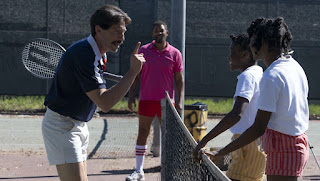Saturday, March 26, 2022
Best Pictures #79: 2021 (94th) Academy Awards Best Picture Nominee: Nightmare Alley (2021)
Wednesday, March 23, 2022
Best Pictures #78: 2021 (94th) Academy Awards Best Picture Nominee: King Richard
Monday, March 21, 2022
Best Pictures #77: 2021 (94th) Academy Awards Best Picture Nominee: West Side Story (2021)
Saturday, March 19, 2022
Best Pictures #76: 2021 (94th) Academy Awards Best Picture Nominee: Belfast
The film begins in August 1969 as young Buddy (Jude Hill) enjoys a sunny, joyful day with other neighbor children and relatives on the streets of his little neighborhood that seemingly out of nowhere explodes into a riot. His mother (Caitriona Balfe), whisks him away to their house, using the trash can lid Buddy had been pretending was a shield as a real shield against the bricks and rocks being thrown by the angry mob. Buddy’s father (Jaime Dornan) is away for weeks at time working in England where he has been offered a permanent job. A small-time neighborhood gangster turned vigilante gang leader lurks around the family and pressures Buddy’s father to join or pay up. Pa and Ma want no part in the conflict, only a safe life for their family. Buddy’s primary confidant is his grandfather, Pop, (Ciarán Hinds in a wonderful and rightfully Oscar nominated performance), who gives Buddy advice about the girl he has a crush on. Judi Dench is a welcome addition to the cast as Granny, usually heard loud and clear even when she is in the background of a shot.
Belfast isn’t so much sentimental as it is nostalgic and wistful. It plays like a memory, not romanticizing the past but recalling how the small joys of life (talks with Pop, adventures with cousins, school projects with a crush) existed right alongside the stresses and dangers that Buddy only half understands but the film fully conveys (overheard conversations about money, living in an undeclared war zone). This is by no means a gritty or violent movie but the threat of violence is ever present. When the vigilante gang leader punches a neighbor it is a shocking moment for Buddy to witness. The riots Buddy and the rest of his family get caught in are chaotic and frightening. The stress these events, in addition to money problems, places on the family is fully felt thanks to the performances of Balfe and Dornan.
The opening and closing shots of modern day Belfast are in bold and striking color. The rest of the film, not exactly a flashback, is shot in stunning black and white, each scene carefully composed not just to catch the eye but to evoke the feeling of a living memory. Time and place are brought to life and the block where Buddy lives, the school, the movie theater are effectively conveyed as the entire world to Buddy and the rest of the characters. I’ll never understand how the brilliant cinematography by Haris Zambarloukos did not receive an Academy Award nomination.

Friday, March 18, 2022
Best Pictures #75: 2021 (94th) Academy Awards Best Picture Nominee: Don’t Look Up
Thursday, March 17, 2022
Best Pictures 74: 2021 ( 94th) Academy Awards Best Picture Nominee: Drive My Car
Not much happens in Drive My Car, but it is not a boring film, at least not for me. The Oscar nominated screenplay by Takamasa Oe and Ryûsuke Hamaguchi, who also directs, greatly expands upon the short story of the same name by Haruki Murakami, which itself is light on plot. Characters are explored deeply and quietly and there are buried emotions delivered with strong performances from a great cast. Despite the character explorations and even the incorporation of another Murakami story (Sherezade, also from the same story collection, Men Without Women), Drive My Car never really justifies its three hour runtime.
Nominee: Teruhisa Yamamoto, producer
Director: Ryûsuke Hamaguchi
Distributor: Bitters End
Release Date: November 24th, 2021
Total Nominations: 4, including Best Picture
Other Nominations: Director-Ryûsuke Hamaguchi; Adapted Screenplay-Ryûsuke Hamaguchi, Takamasa Oe; International Feature Film


































